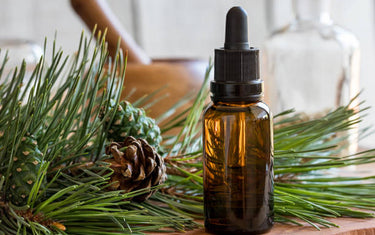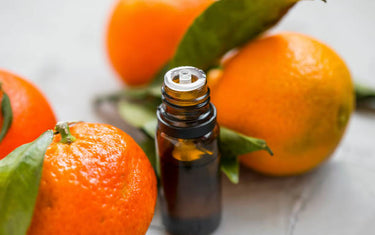7 min read / 25 March 2024 / yasmin sharp
8 Benefits and Uses of Pine Needle Oil
Explore the remarkable health and wellness benefits of pine needle oil, from air purification to stress reduction.

Whenever you want to recall the festive spirit and the scent of an uplifting Christmas tree, pine needle essential oil is the go-to source.
The trees are held in high regard in cultures across the world, displaying an ability to withstand temperatures as low as -40 degrees Celsius, as well as the high temperatures of the Mediterranean, while still providing a natural forest freshness.
But pine needle oil benefits are not only known for their durability, as they possess a host of properties that can help our wellness.
In this article we take a closer look at how pine needle oil has established itself in the world of aromatherapy and some of the health-positive qualities it has to offer.
What is pine needle oil?Pine needle oil, which is also sometimes called “Scots Pine” or referred to by its botanical name Pinus Sylvestris, is native to Australia and extracted from the pine tree via steam distillation. It is famously known for its unique scent, which is reminiscent of a Christmas tree, bringing to mind seasonal and festive memories when diffused or applied topically. The oil is pale yellow in colour and is widely used in a host of household items, including air fresheners, floor cleaners and disinfectants. Whilst it comes from the same source, the oil is different to pine needle extract and it provides purifying and protective properties that can be used to prevent certain diseases and infections. |
How does pine needle oil work?
Pine needle oil works in a variety of ways to boost your wellbeing, with its natural properties benefiting everything from your skin to your hair.
For example, when applied topically the oil can help to soothe inflammation, dryness and itchiness, whilst also working to prevent fungal infections and to enhance circulation.
Pine needle oil contains medicinal qualities too, with some stating that it can support immune function and combat symptoms of colds and coughs to boost recovery.
In aromatherapy applications, the scent of pine needle essential oil positively impacts mood by energising the body to clear the mind of stress and anxiety and to eliminate fatigue.

What are the benefits of pine needle oil?
The benefits of pine needle essential oil can be seen when it is used to:
1. Help to purify the air
Pine needle is renowned for its air cleansing abilities, with the scent used in a host of air fresheners and similar products.
And pine needle oil’s ability to purify the air isn’t just based on its scent, as some studies have found evidence that it can effectively remove airborne toxins.
For example, one study tested pine oil against thirteen species of fungi, bacteria and other toxins. [1]
Their presence was reduced after coming into contact with pine needle oil, with bacteria finding it particularly difficult to thrive.
Try diffusing the oil or combining it with water in a spray bottle to add an extra layer of protection for yourself and your home during cold and flu season.
2. Reduce inflammation and protect the heart
Pine needle oil benefits can be used to reduce inflammation in the body and to minimise discomfort, especially when applied topically.
Some people dilute pine needle essential oil with a carrier oil before rubbing the solution into sore and swollen joints and muscles, which can provide a certain level of pain management.
Researchers have learned that pine bark also contains anti-inflammatory lignans, which suggests that it could reduce strain on the heart and improve its overall health. [2]
A separate study found that there are a multitude of different compounds contained in pine bark that could also help to inhibit the production of pro-inflammatory mediators. [3]
3. Cleanse the home
The antibacterial effects of pine needle oil also make it a useful addition to homemade cleaning sprays.
All you need to do is add a few drops of pine needle to a spray bottle of water along with a dash of dish soap to help emulsify, shake well and spritz onto contaminated surfaces to cleanse and purify.
It is also sometimes used as a carpet cleaner, as it creates a pleasant scent to cover up unwanted odours that are coming from beneath the surface of the floor covering.
4. Boost skin health
The antibacterial benefits of pine needle oil could make it useful for treating certain skin conditions such as rosacea, acne and eczema, helping to remove unwanted bacteria from pores.
This can work in tandem with the oil’s anti-inflammatory properties to reduce redness and discomfort in sensitive parts of the skin.
A study from 2007 also found that pine needle extract exhibited antifungal activity. [4]
However, the extract was mixed with other chemicals, so further tests are needed to understand how it would perform in isolation.
5. Lower stress and anxiety levels
Diffusing pine needle oil offers a great way to enjoy its refreshing and relaxing scent, with its aromatherapeutic benefits helping people to manage moments of stress and anxiety.
The results of one study suggested that the refreshing aroma of pine needle oil was able to relieve symptoms of low mood and anxiety, whilst also improving concentration and memory loss in some participants. [5]
There have also been suggestions that the natural properties of pine needle oil can combine to create an energising feeling in the brain that reduces stress levels.

6. Relieve and reduce headache symptoms
In addition to its ability to decrease toxins in the air, pine needle could also be used to relieve and reduce headache symptoms.
The results of a randomised, placebo-controlled study published in 2008 stated that pine bark extract proved to be very effective at reducing pain in women with dysmenorrhea. [6]
Some women use a diluted pine needle essential oil solution to give them more control of their mood, which can sometimes be the cause of migraines and PMS-related headaches.
You can try this by mixing a few drops with a teaspoon of carrier oil and rubbing it onto your chest or temples, allowing you to naturally breathe the oil into your system.
7. Provide antioxidant protection
Pine trees contain Oligomeric Proanthocyanidin Compounds (OPCs), which act as strong antioxidants that can prevent damage in our bodies.
When there is an imbalance between antioxidants and free radicals in our bodies, this can lead to oxidative stress which impacts our tissues and organs.
Pine needle essential oil is comprised of compounds such as linalool, limonene and α-terpineol, and has been found to provide powerful antioxidant in reducing power assays, in lipid peroxidation and has also demonstrated activity against in scavenging free radicals. [7]
8. Work as an allergy fighter
You may find that you could enjoy the benefits of pine needle oil during the colder months of the year which can help to prevent the spread of viruses, ridding the air of harmful microbes.
Diffusing the oil or adding it to an oil burner can make it easier to breathe and deal with watery eyes, allergic rhinitis or flu-like symptoms.
Another option could be to inhale directly from the bottle or to add a few drops to a handkerchief or cotton ball so you can use it no matter where you are.

How do you use pine needle oil?
Popular uses of pine needle oil include skincare and in soaps and candles.
You can also use it as:
A massage treatment
Pine needle oil benefits can be enjoyed by diluting it with a carrier oil of choice and applying to sore muscles and joints.
It adds a warm sensation to the skin that relaxes the body, making it ideal for use following strenuous and tiring activities.
An aromatherapeutic agent
You can unlock more benefits of pine needle oil through aromatherapy, with its refreshing, balsamic scent adding a bright, seasonal aroma.
Mix 5-7 drops with water and add to an oil burner or diffuser and allow the earthy scent to drift through your senses to bring a sense of calm.
What is the history of pine needle oil?
The Ancient Greeks were pioneers when it came to pine needle oil uses, with the ‘Father of Medicine’ Hippocrates regularly including it as part of his medicinal treatments.
The Ancient Egyptians also relied on pine as a cooking tool to kill off food bacteria and decrease contamination.
The shoots and needles of the plant were used by Native Americans and Europeans to treat fevers, respiratory conditions, and chronic rheumatism.
It is also believed that pine needles used to be stuffed inside mattresses to help repel fleas and lice.

Pine needle oil FAQs
What are the side effects of using pine needle oil?
Most people who use pine needle oil do not experience any issues, although there are some things to be aware of.
Before applying it topically for the first time, it is a good idea to complete a patch test to check compatibility with your skin.
The oil should not be consumed and if you experience any irritation or allergic reaction, stop using the oil immediately.
What does pine needle oil smell like?
Pine needle essential oil’s scent brings to mind the smells of the forest, with its crisp, earthy scent producing a pleasingly natural smell.
It blends particularly well with essential oils like clary sage, eucalyptus, frankincense and bergamot.
Is pine needle oil good for hair?
Pine needle essential oil is believed to contain antimicrobial properties that can not only remove bacteria, but also cleanse dead skin, dirt and excess oil.
This can minimise the risk of infection, itchiness and inflammation, which helps to boost the hair’s natural shine and smoothness.
[1] Ona Motiejūnaite et al. (2004) Fungicidal properties of Pinus sylvestris L. for improvement of air quality https://pubmed.ncbi.nlm.nih.gov/15300001/
[2] Jari Sinkkonen et al. (2006) Lignans from the bark extract of Pinus sylvestris L https://pubmed.ncbi.nlm.nih.gov/16489551/
[3] Maarit Karonen et al. (2004) Phenolic extractives from the bark of Pinus sylvestris L. and their effects on inflammatory mediators nitric oxide and prostaglandin E2 https://pubmed.ncbi.nlm.nih.gov/15675800/
[4] Kyung-Hwan Jung et al. (2007) Furfural from Pine Needle Extract Inhibits the Growth of a Plant Pathogenic Fungus, Alternaria mali https://www.ncbi.nlm.nih.gov/pmc/articles/PMC3763085/
[5] Samira Bolandghamat et al. (2011) Effects of ethanolic extract of pine needles (Pinus eldarica Medw.) on reserpine-induced depression-like behavior in male Wistar rats https://www.ncbi.nlm.nih.gov/pmc/articles/PMC3173901/
[6] Nobutaka Suzuki et al. (2008) French maritime pine bark extract significantly lowers the requirement for analgesic medication in dysmenorrhea: a multicenter, randomized, double-blind, placebo-controlled study https://pubmed.ncbi.nlm.nih.gov/18567279/
[7] Wei-Cai Zeng et al. (2012) Chemical Composition, Antioxidant, and Antimicrobial Activities of Essential Oil from Pine Needle (Cedrus deodara) https://ift.onlinelibrary.wiley.com/doi/abs/10.1111/j.1750-3841.2012.02767.x









